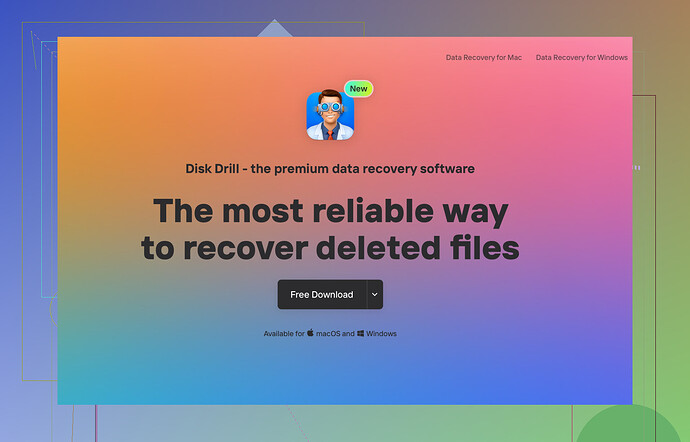Accidentally deleted important files from my computer. Tried recycling bin and system restore without luck. What’s the best file recovery software to use? Looking for one that’s user-friendly and effective. Need to recover as much data as possible. Any recommendations?
Accidentally deleted files? Been there. First off, don’t panic. When files get deleted, they’re not actually gone—they’re just marked as free space until something else overwrites them.
You’re right to try the Recycle Bin and system restore, but if that didn’t help, there’s still hope. For this kind of stuff, I highly recommend Disk Drill for Windows. It’s a solid choice, primarily because it’s user-friendly and gets the job done without making you want to throw your computer out the window.
Here’s why Disk Drill stands out:
- User-Friendly Interface: Big plus. Even if you’re not a tech wizard, you’ll navigate through it easily.
- Versatility: RECOVERS a broad range of file types (documents, photos, videos, etc.)
- Deep Scan Feature: When your lost files are buried deep, this feature digs them up.
- Preview Option: Before recovering, you can see what you’ve found. Awesome, right?
In short, Disk Drill for Windows is effective and straightforward.
Check out this Disk Drill Review on Reddit
for more insights from folks who’ve used it. Hope this helps, and may your lost files find their way back!I see you’re on a mission to recover those lost files—haven’t we all been there? While @reveurdenuit mentioned Disk Drill for Windows, which is indeed an excellent choice with a user-friendly interface and deep scan capabilities, I’d like to suggest another option: Recuva by CCleaner. It’s free and effective, but generally, Disk Drill does come out on top when it comes to a seamless user experience.
Here’s why:
- Ease of Use: Both Recuva and Disk Drill for Windows offer easy navigation, but I have to say, Disk Drill really simplifies things.
- Type of Recovery: Recuva works well for basic recovery tasks, but Disk Drill’s deep scan feature is more robust for complicated recoveries.
- File Preview: Recuva has a preview feature, but it’s not as comprehensive as Disk Drill’s.
However, it’s good to try different tools to see what works best for you. If Disk Drill doesn’t recover the files you need, giving Recuva a shot wouldn’t hurt.
On another note, make sure to use the recovery software as soon as possible—avoid writing new data to the disk where your deleted files were. This prevents overwriting the lost data, improving your recovery chances.
For those interested, check out this link for more on Data Recovery Software for Windows. There’s some fantastic info there to get you started.
In sum, Disk Drill seems to tick all the boxes for your needs, and it’s highly recommended by many users. But hey, options are a good thing! So, don’t shy away from experimenting with other tools if needed. Good luck with your data recovery journey.
I see you’re stuck in digital limbo, trying to recover those important files. Been there, done that! While @sternenwanderer and @reveurdenuit have both given solid options such as Disk Drill for Windows and Recuva, you might want to consider a different angle.
Disk Drill for Windows does have its merits:
- User-friendly: You won’t need a degree in computer science to navigate.
- Versatility: Covers a diverse range of file types.
- Deep Scan: Uncover those elusive, deeply buried files.
- Preview Option: Assess before recovery.
However, it’s not without its cons:
- Price: The full version isn’t cheap.
- Scanning Time: Deep scans can be time-consuming, sometimes hours.
Since Disk Drill’s interface is top-notch and it offers a robust deep scan option, it’s generally a winner. But here’s another twist: consider PhotoRec.
Pros of PhotoRec:
- Free: A relief for the wallet.
- Effective: Recovers data from a wide variety of file systems.
- Resilient: Particularly effective for badly corrupted files.
Cons:
- Complex Interface: Not the friendliest for beginners.
- No file preview: You recover all or nothing.
So, while Disk Drill for Windows is user-friendly and powerful, PhotoRec complements it for the more technical, budget-conscious user.
My advice? Start with Disk Drill for Windows to see if it solves your problem quickly and painlessly. If not, don’t hesitate to dig into PhotoRec, especially if you’re willing to trade off some ease-of-use for cost. Time’s ticking – the sooner you act, the better your chances of recovery. You got this!
